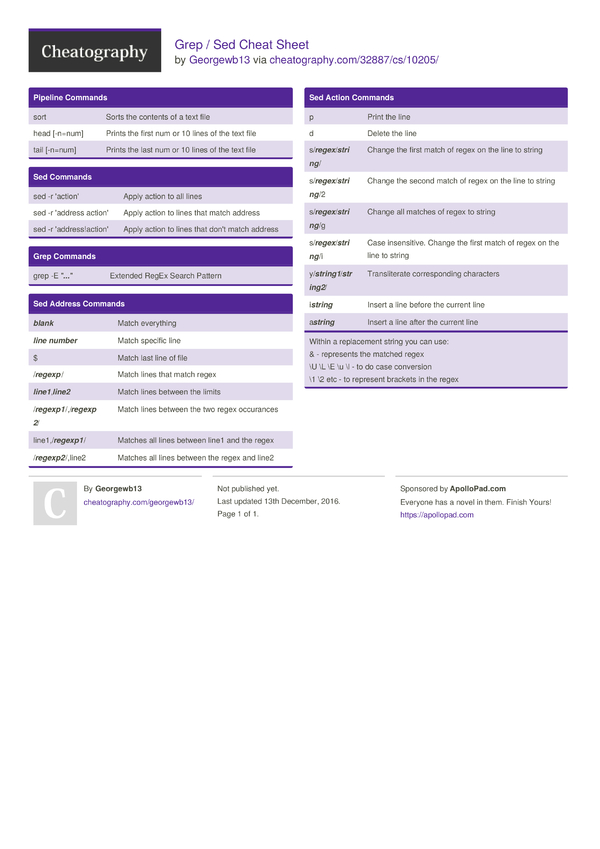Egrep Cheat Sheet
Grep is the quintessential text search tool of the Unix shell. Many text search tools like ack and ag are popular now for searching in source code. But, for most common scenarios grep can still be a fast and good enough solution. It is available on every Linux machine you will be working at, so it is a huge bonus to be aware of its usage and capabilities.
- Trivia: If you type
:help grepin the Vim editor, you will see the origin of the name grep:
Ngrep Cheat Sheet with examples Posted on Jan 13, 2016 by Corinna in Development, DevOps & SysAdmins 0 comments ngrep is a UNIX tool that lets you search through network traffic. OpenWrt which runs on the Atheros AR 9331 of Arduino Yun, LLC edition OpenWrt-Yun also Linino is obsolete in the kernel and various packages (and there are security problems).
- The most important use of grep is to search for text from standard input. This is usually done by piping output of another command to grep and searching in that. For example:
Note that the search text can be a regular expression. You can find more info about regular expressions from other detailed sources.
- To search for any of a set of words, separate the words with
|:
- The other common use of grep is to search for text in files. For example:
Note that the *.txt is expanded by the shell and those filenames are passed to grep. Grep does not lookup the filenames. Picasa latest version free download for mac.
- To grep for special characters, like
tabfor example:
More information about the search for special characters can be found in the ANSI-C Quoting section of the Bash manual.
I find the above tab search useful to check if there are any stray tab characters in the code base which is supposed to be using only spaces for indentation.
- To ignore case of the search text (make it case insensitive), use the
-ioption:
- Since the filename lookup is actually done by the shell, it is not recursive by default. To search recursively in all files and directories starting from current directory:
Note again, that the wildcard is expanded by the shell and passed to grep. Grep then takes each of those directories and it recurses through them on its own.
- To reverse the search, that is, to select lines that do not match the pattern:
- To exclude certain files, say save files, from grep use the
--excludeoption:
To exclude multiple types of files, specify multiple --exclude options.
- To exclude certain directories, say Git directories, from grep use the
--exclude-diroption:
To exclude files based on glob patterns, you can also put those patterns in a file and pass it to the
--exclude-fromoption. However, this did not seem to work for me.By default, grep prints the file paths which have the search text. To print the line number, along with the file paths, use the
--line-numberoption:
- Grep throws out a wall of text where the searched text can be hard to find. Asking it to use color using
--colorcan be an useful option:
On my computer, this shows the file path in purple, the line number in green and the searched text in red.
- When searching text in source code files, it is helpful to get some context of where the text is found. Using the
-Coption you can ask grep to show you some lines of context around the result lines. For example, to get 3 lines of context above and 3 lines of context below every result line:
- Your shell expands both matching filenames and directories and passes them as input to grep. When grep gets a directory as input, it warns that it Is a directory. For other files it might also give warnings such as No such device or address or Permission denied. To hide such messages use the
--no-messagesoption:
- Grep does look through binary files by default. If the searched text was found, it will just report that the binary file has that text, it does not try to print the matching line, for obvious reasons (no line separators in binary file). However, if you do not want grep poking around in binary files, use the
-Ior--binary-file=without-matchoption:
Modio mac download. Tried with: Grep 3.1 and Ubuntu 18.04
Cheat sheet based off the Udemy cysa+ course from Jason Dion – video 75 as i’m sure i’ll end up looking for it at some point in the future.
REGEX:

[] – Match a single instance of a chracter from a range such as a-z A-Z 0-9 or for all [a-zA-Z0-9]
[s] – Match whitespace
[d] – Match a digit
+ – Match one or more occurrences e.g. d+-
*- Match zero or more occurrences e.g. d*
? – Match one or none occureences e.g. d?
{} – Match the number of times within the braces e.g. d{3} finds 3 digits in a row or d{7-10} matches 7,8,9 or 10 digits in a row
| – OR
^ – Only search at the start of a line
$ – Only search at the end of a line
GREP:
-F = search for a literal value, can use “” instead of -F
Grep Regex Cheat Sheet
-r = recursive

-i = Ignore case sensitivity Nba for mac free download.
-v = Find things which do not match
Egrep Cheat Sheet Pdf
-w = Treat search strings as words (instead of parts of words)
-c = Show count of matches
-l = Return names of files containing matches
-L = Return names of files without matches
